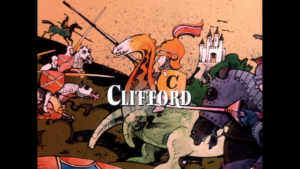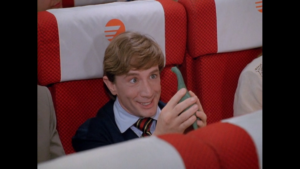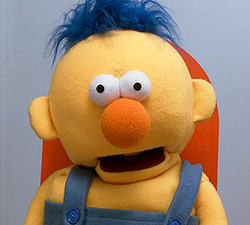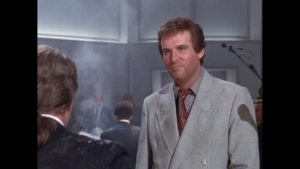Clifford (1996)

“It’s bad in a new way all its own. There is something extraterrestrial about it, as if it’s based on the sense of humor of an alien race with a completely different relationship to the physical universe. The movie is so odd, it’s almost worth seeing just because we’ll never see anything like it again. I hope.” – Roger Ebert
I sent my co-conspirator these words of Ebert wisdom knowing they would make the movie irresistible to him, and inspire him to track it down. I knew not what I did, and I beg forgiveness of the movie saints. He gave to me the apple and I ate of it.
It begins with an inscrutable framing device involving a Catholic school in the future, before revealing itself to be a vehicle for the antics of Martin Short, portraying a mischievous, unsettling child wreaking havoc through the world of uncomprehending adults, mostly his uncle (Charles Grodin) and his fiance (Mary Steenburgen). These are actors who can certainly do a standard PG comedy as easily as anything, and yet their performances have a persistent stilted strangeness here.

“If Clifford is not a real little boy, then what is he? The movie doesn’t know and neither does the audience, and for much of the running time we sit there staring stupefied at the screen, trying to figure out what the hell we’re supposed to be thinking.” – Roger Ebert.
It’s essentially a ‘90s family comedy, superficially like any other, but pervaded by an evil, alien presence attempting constantly to claw through its surface. I cannot bring myself to describe it further, directly, but I will attempt to outline the malignant vision it has bestowed on us.

Not from the movie, just how we felt about it.
Cliffordesque.
This is the word we now hold in our troubled hearts. We keepers of the word cannot tell you what it means, and for God’s sake don’t ask us to show you. It is to Lynchian roughly as Lynchian is to everything else.
The Cliffordesque cannot be considered bad. The Cliffordesque inhabits a world to which no aesthetic values familiar to us can apply. It is almost like the persistent strangeness of Nic Cage’s performance in Vampire’s Kiss (1988); but Vampire’s Kiss combines recognizable genres and in so doing becomes the pinnacle of each of them; Clifford has an unnerving family resemblance to a single genre.
It’s a nightmarish quality, like walking into your kitchen and having the unassailable feeling that all its contents have been quietly replaced with exact replicas of those things—that’s how Clifford relates to the ’90s family comedy that it almost seems to be. It takes you to a place where genre itself is obliterated, where you doubt the existence of film, and then of reality. After an hour and a half in its world, the movie makes you want to hug someone, or have a real human conversation, to make sure both you and the world before your eyes are actually real and here to stay.
It is a sitcom theme song played on a saxophone made from a human thigh bone. It is a toddler’s birthday party thrown for an 80 year old man. It is a teddy bear with watering human eyes, staring at you unblinking from the corner of a room that will never, truly, be yours again.
This we have witnessed in this Year of Our Lord 2016, and this is our review.

“I underestimated the Evil One. Well, Clifford, what shall we do? Whatever shall we do now?”
